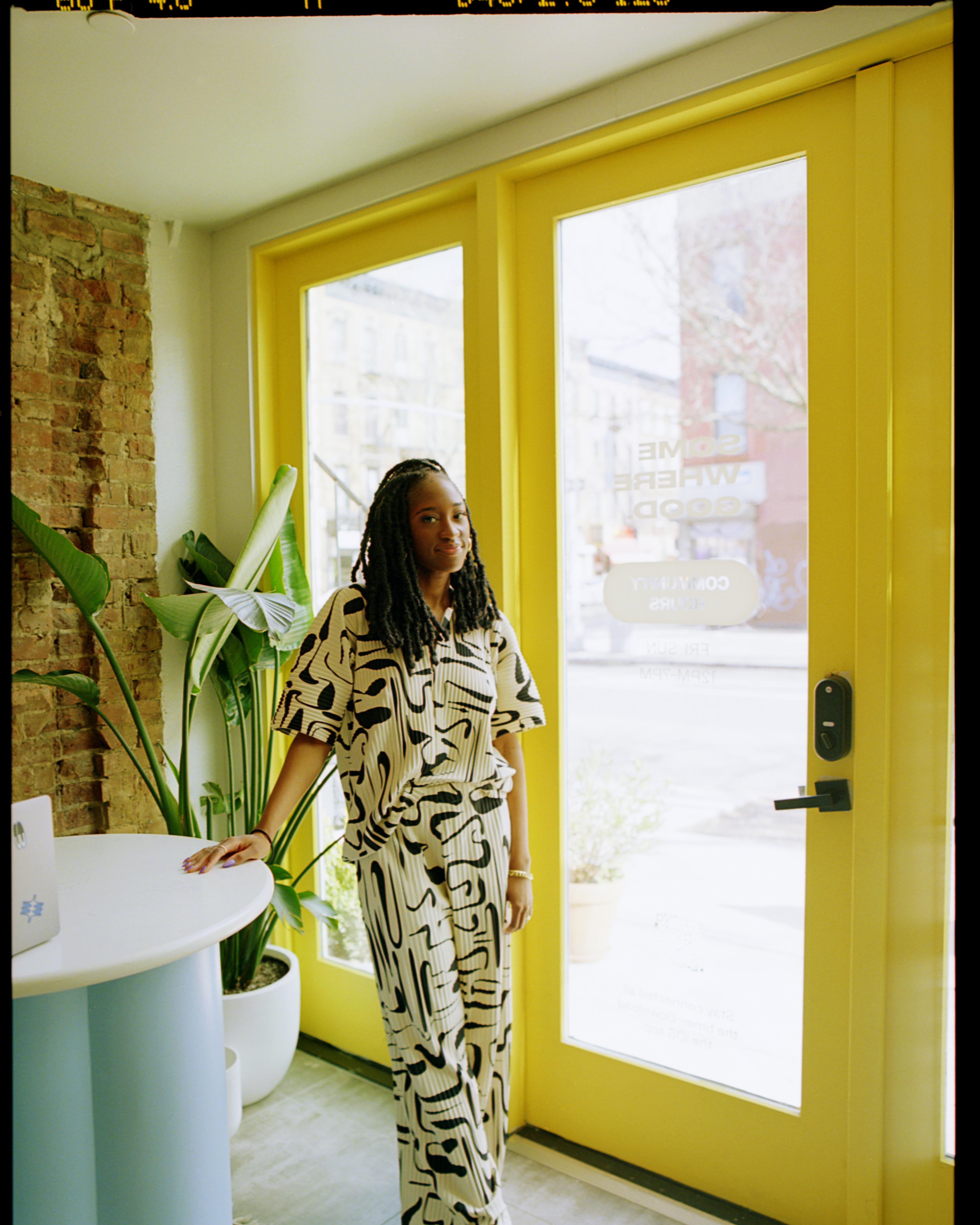Naj Austin pivots with a mission
This founder's pivots online, then offline, then hybrid helped her fine-tune her mission.
Written by Michelle Hyun Kim
Photography by Kristina Dittmar
“No laptops here, please,” read the signs on the tables of Somewhere Good, a storefront space in Brooklyn, New York that is welcome to virtually everyone. Here, in this space filled with house plants, flower cushions, throw blankets, books on abolition, and wafting ribbons of incense, visitors aren’t meant to work or engage in any consumer activities — nothing is for sale. Instead, anyone who has a registered account on Somewhere Good’s digital platform is allowed to use the facilities during opening hours from Friday to Sunday, to read, relax, play games, and connect with others. Members are encouraged to organize their own gatherings. There are yoga clubs and bell hooks book readings.
“To get people to this place of connection, you have to move them outside of the typical ways that they know how to interact with each other,” Austin explains to me when I visit the space, which she’s coined “Bed-Stuy’s living room.” It’s a sunny January afternoon. Austin gives me a tour of the snack-stocked kitchen, outdoor backyard, event board, and nap area. The 32-year-old entrepreneur waves hello to familiar faces who start streaming through the door almost as soon as they open at noon.
"“People want to be connected, but they’re in these digital spaces that aren’t really serving them."
Somewhere Good is the product of two pivots that Austin has done since the start of the pandemic. What she has managed to retain despite these changes is the trust and interest of the community who engages with the space — if anything, these things have grown.
Though the Somewhere Good space that we sit in opened in July 2021, Austin has been building the groundwork since her first venture, Ethel’s Club — a social club, wellness platform, and coworking space for people of color that she launched in 2019. Back in 2019, before she even had a physical location, Austin built up a waitlist of 4,000 people. Many signed on to pay $195 each month to have access to the coworking facilities, which included typical office amenities like fast wifi and printing. For $65 a month, others signed up to just hang out.
Yet, only four months after Ethel’s Club opened up in Williamsburg, the pandemic hit. Like most everyone else, Austin and her team scrambled to pivot online, with hopes that everything would “go back to normal” in two weeks. “I remember being at Ethel’s Club that day, being like, ‘OK, so we’re gonna go online. What do we do? What do you want us to do?’ There was really no larger thought.”
But the roadblocks only helped Austin iterate. She said the pandemic had a silver lining — it helped her reflect on why she was a founder and become super clear on her mission.
She grew up in New Jersey. At 11, she had a startup idea called “Snap,” where you could bring a party to life at the snap of a finger. As she grew older, she was influenced by texts by Toni Morrison, Audre Lourde, Angela Davis, bell hooks, Sonia Sanchez — ”people who spent a lot of time thinking about what it means to be in community.” “We are just people looking for each other,” she says. “If I feel like I’m straying from that, it’s wrong.”
Austin decided to launch the Somewhere Good app a month into the pandemic on iOS in April 2021. They raised $3.75M in seed funding led by True Ventures, along with well-known angels like Gabrielle Union and former Reddit CEO Ellen Pao.
“With Ethel’s Club, we had accounted for flooding, tsunamis, fires, for someone dropping dead, but never for a pandemic. When you gain the understanding that you can’t anticipate everything, you wake up each day asking yourself what you’re going to do, knowing that the answer might not be part of the plan. It becomes about having a clear goal and realizing you may have to juke left or right to get there.”
She envisioned that Somewhere Good might become a hybrid digital watering hole for deeper, nuanced discussions online — and when things would open up, perhaps those conversations would help lead to deeper, nuanced relationships in person.
“People want to be connected, but they’re in these digital spaces that aren’t really serving them,” Austin says. “What we're trying to do with Somewhere Good is help people use their phone as a tool. It’s a reminder to look up and really connect with one another.”
Every day, a new set of prompts launch on the platform. Does vocalizing boundaries come easily to you? What dish can you make with your eyes closed? What if Bed Stuy was a Black utopia? Users can answer questions through voice notes, which Austin says can capture a personality better than text or pictures. There’s also room for more nuance, she adds. ”With voice, people tend to be kinder and react with more care than being a keyboard warrior.”
This also guided some of Austin’s decisions with the app. Early on, Somewhere Good decided against using third-party social platforms like Instagram and Twitter to reach people, like the team had with Ethel’s Club. Instead, they decided to build their own app from scratch. This would help create more intimacy and a more tailored social experience, explains Austin. The UX is meant to feel “cozy and warm,” and act as a contrast to the fast-paced, addictive, and oft-chaotic content that fuels most popular social media.
Austin also decided to abandon Ethel Club’s membership fee and coworking space offerings. “I started to feel conflicted about building space with an identity in mind and then charging for it,” she admits. “I don’t want to see people as just commodities that can benefit us. And there aren’t a lot of spaces for people to envision alternatives. Somewhere Good shows us that it’s possible to build this communal moment where people are sharing and taking care of one another.”
In the half-year that the location has existed, Austin has been impressed with how creative people have gotten with the space. Even when attending something like, say, a knitting club, the conversation quickly gets reflective.
“It harkens back to houses of worship,” says Austin. “There’s a ritual here. You see the same people on the same day, you know the routine. I think that young people are specifically craving that.”
There are now ten people milling about. A few plop into comfy chairs with their laptops in tow, ignoring the signs. Austin waves hello, takes in the scene. “Don’t worry too much about pivoting as long as you’ve got your mission down,” she says to me. “Whatever that pivot may be, maybe it’s the thing that allows it to take off.”

Never miss another untold story.
Subscribe for stories, giveaways, event invites, & more.
More Like This
